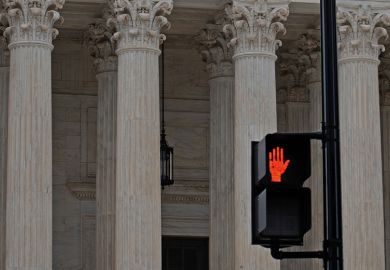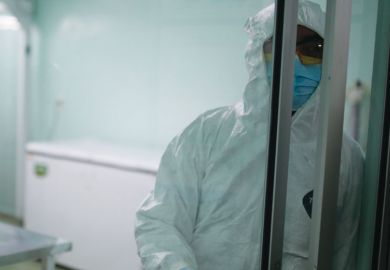The higher education sector is a key cog in many national economies. The UK sector, for instance, generates about £95 billion a year and supports more than 815,000 jobs in pursuit of its mission to educate tomorrow’s workforce and play a leading role in global research.
Yet academia is not a happy place. International studies show that postgraduate students are more than 10 times as likely to experience moderate-to-severe depression and anxiety compared with the general population, and they face a similarly high risk of suicide. If these figures are transposed to the UK student population, then every 24 hours, over 100 students in the UK can be predicted to suffer harm as a direct result of their engagement in postgraduate study. In England, this situation endures despite the recent establishment of the Office for Students, whose stated regulatory objective is to ensure that “students’ interests are protected”, but which has been criticised for a lack of independence from a government that has recently stopped short of imposing on universities a legal duty of care for students.
While universities have a responsibility to conduct teaching and research to agreed, externally monitored standards, they govern their own affairs when it comes to the professional behaviour of staff. But the evidence suggests that both the principles and practice of this governance have gone badly awry.
As examples, staff in UK higher education routinely work almost double their contracted hours, with over half showing signs of depression. Reports show that 32 per cent of UK university employees have experienced bullying, which ties in with institution-specific reports. Some 39 per cent have experienced or witnessed sexual violence, and one in five female students has been the victim of sexual assault at university. Also common are instances of elitism, academic misconduct such as cheating and predatory publishing, and legal violations such as enabling financial crime, misrepresentation, false advertising, wage theft, and health and safety at work breaches.
Campus resource: Addressing sexual misconduct in higher education, part one: prevention
Yet little effective action is taken. The non-obligatory guidance and charters issued by bodies and thinktanks (such as the UK’s University Mental Health Charter) consistently fail to acknowledge the academy’s role in the harm experienced by students and staff, while university leaders seem to regard the perpetrators of misconduct as rare bad apples whose misdeeds are best swept under the carpet, rather than allowing their actions to sully the reputation of a sector that is essentially above ethical reproach. Hence, nearly a third of UK universities have used non-disclosure agreements to suppress complaints – while academics are said to be “suffering in silence” amid widespread fear of reprisals for complaining about workplace abuse.
University of Cambridge academic Wyn Evans wrote in a Times Higher Education opinion piece published last October that the reaction to a previous piece he had written, “Bullying is a feature of UK universities, not a bug”, was “an outpouring of pain and distress” from fellow academics. I agree with him that, as the headline put it, “Investigating serious abuses must be taken out of universities’ hands”, but I don’t think his solution of an ombudsman to handle allegations of serious abuse is sufficient. An ombudsman’s decision may not be legally binding and its enactment can be impeded by false arguments of autonomy. Moreover, most universities have immense resources to brush off fines, and even if an academic is fired for misconduct, there is nothing to stop them taking another job and doing the same thing again, especially if their behaviour is covered up.
I believe that the academic profession should adopt the model of other professional sectors such as healthcare, law and engineering, where the right to practise is conferred by registration with a professional body, and where individuals who fail to adhere to professional standards can be struck off. After all, academics meet all of the criteria to be classed as top-level professionals (expert knowledge, extensive training), and their potential for misconduct and harmful abuse is equally apparent and evidenced.
Genuinely supporting the interests of students and academics requires not just OfS-style system management, but also a binding accountability at an individual level, whereby those in positions of trust and responsibility conduct themselves transparently and accountably, with meaningful sanctions for misconduct. This would pose no threat to university autonomy or academic freedom, which are the OfS’ two stated “vital ingredients” to the “health of our higher education sector”.
Of course, even professional registration is not a failsafe against abuse. As Evans notes, the case of the UK neonatal nurse, Lucy Letby, whose murderous malpractice was apparently swept under the carpet for years, illustrates that the urge to protect institutional reputations will always be high on senior managers’ priority lists. But it is surely better than what we have.
Given the clear harm that is caused to students and staff, effective regulation is a key step to protect the reputation of individual universities and the sector as a whole. Academia is rightly seen as a challenging environment, but it also needs to be a safe and rewarding one, with staff that perform to certifiably high standards.
Nicholas Rowe is an educationalist, with trans-disciplinary interests in scientific communication and educational/doctoral development.
Register to continue
Why register?
- Registration is free and only takes a moment
- Once registered, you can read 3 articles a month
- Sign up for our newsletter
Subscribe
Or subscribe for unlimited access to:
- Unlimited access to news, views, insights & reviews
- Digital editions
- Digital access to THE’s university and college rankings analysis
Already registered or a current subscriber?








